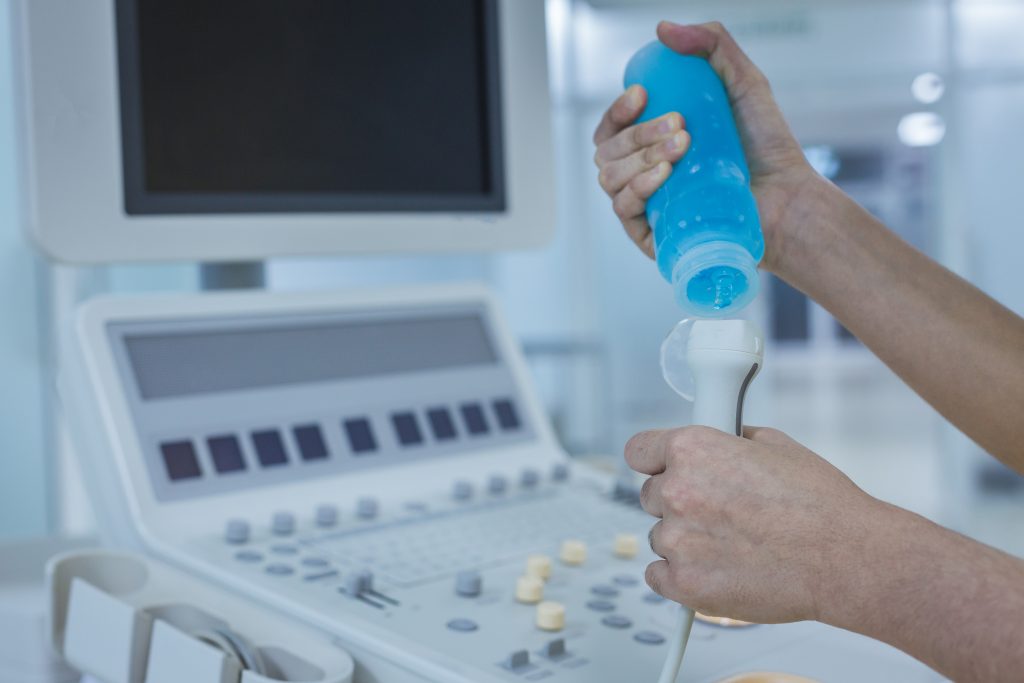
Cardiac diagnostic tests are used to understand the complexity of heart disease, injury, and congenital (present at birth) or acquired abnormalities. One of the most common diagnostic tests performed is echocardiography.
What is Echocardiography?
The term echocardiography refers to the test itself, which uses sound waves to produce live images of your heart, whereas the image it produces is called an echocardiogram. Both terms are often used interchangeably. You also commonly hear it referred to as an echo.
Echocardiography uses ultrasound waves to produce images of the heart allowing cardiologists to view your heart’s structure, size, and how it moves. There are several different types of echocardiography:
- Transthoracic echocardiography is the most common type of echocardiography. It is noninvasive and painless. A transducer is placed on your chest and emits ultrasound waves toward your heart. A computer then interprets these sound waves to produce a live image that is displayed on a monitor.
- Transesophageal echocardiography may be recommended if transthoracic echocardiography doesn’t produce definitive images. For this test, a much smaller transducer is inserted in your mouth and guided through your esophagus to gain a better view of the heart.
- Stress echocardiography uses traditional transthoracic echocardiography in combination with an exercise or medication-induced stress test to evaluate how the heart performs under stress.
- Three-dimensional echocardiography uses either transthoracic or transesophageal echocardiography to take multiple images from different angles in order to create a 3-D image of the heart. This type of echocardiography is typically used prior to heart valve surgery or to diagnose congenital heart problems.
When is Echocardiography Used?
Echocardiography may be used for a variety of reasons. It is most commonly used to investigate signs or symptoms of heart diseases like shortness of breath, chest discomfort, or swelling in the legs.
Echocardiograms are used to help:
- Evaluate the overall function of your heart
- Determine the presence of many types of heart disease
- Monitor the progress of valve disease over time
- Evaluate the effectiveness of your medical or surgical treatments
Depending on your need, echocardiography may be ordered on its own or in conjunction with other diagnostic tests like blood work or an electrocardiogram (ECG or EKG).
Preparing for an Echocardiogram
No special preparations are necessary. Depending on the type of echocardiography, your doctor may instruct you not to eat, drink, or smoke prior to your appointment (except for water).
Your doctor may also ask you to stop taking certain heart medications on the day of your test. If you have questions about your medications, ask your doctor. Do not stop taking any medication without first talking with your doctor.
What to Expect During the Test
An echocardiogram should take no more than an hour.
You will be asked to lie down so a sonographer or ultrasound technician can perform an ultrasound on your heart. A special gel will be applied to your skin allowing the transducer to emit sound waves that will ultimately produce images of your heart’s movement and internal structures.
The transducer will be placed directly on your chest, above your heart. The technician will press firmly as he or she moves the transducer across your chest. You may be asked to breathe in or out or to hold your breath briefly during the test. For most of the test, you will lie still.
The gel might be a little cold, but otherwise, you should not feel any major discomfort during the test.
In some cases, doctors might need to inject a contrast agent into your bloodstream in order to see the borders of the heart better.
Test Results
When your test is completed, you may be asked to schedule an office visit with your physician to discuss the test results, or your physician may choose to call you with the results.
Normal results are an indication that your heart is working properly and your blood vessels are not obstructed due to coronary artery disease. However, abnormal results may mean that your heart isn’t effectively pumping blood. This may be due to a blockage in your blood vessels or damage from a previous heart attack.
Your cardiologist will combine the information provided by the echocardiogram with your medical history and symptoms to make decisions about the need for further testing or management.
The physicians at Clearwater Cardiovascular Consultants have expertise in a range of outpatient cardiovascular services, including echocardiography. We offer patients comprehensive care that is backed by experience, expertise, and the latest technology. Call Clearwater Cardiovascular Consultants at 727-445-1911 to make an appointment, or request an appointment online
